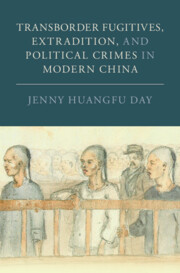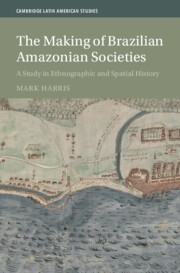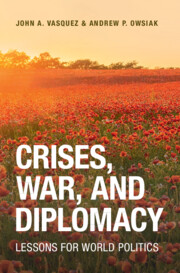Refine search
Actions for selected content:
615880 results in History

Transborder Fugitives, Extradition, and Political Crimes in Modern China
- Coming soon
-
- Expected online publication date:
- November 2025
- Print publication:
- 30 October 2025
-
- Book
- Export citation

Socialist De-Colony
- Black and Soviet Entanglements in Ghana's Cold War
- Coming soon
-
- Expected online publication date:
- November 2025
- Print publication:
- 20 November 2025
-
- Book
- Export citation

Negotiating Imperialism
- Murakami Naojirō's Archival Diplomacy
- Coming soon
-
- Expected online publication date:
- November 2025
- Print publication:
- 20 November 2025
-
- Book
- Export citation

African Literature in Transition
- Intellectual Traditions of African Literature, 1960–2015
- Coming soon
-
- Expected online publication date:
- November 2025
- Print publication:
- 20 November 2025
-
- Book
- Export citation

The Making of Brazilian Amazonian Societies
- A Study in Ethnographic and Spatial History
- Coming soon
-
- Expected online publication date:
- November 2025
- Print publication:
- 20 November 2025
-
- Book
- Export citation

Crises, War, and Diplomacy
- Lessons for World Politics
- Coming soon
-
- Expected online publication date:
- November 2025
- Print publication:
- 20 November 2025
-
- Book
- Export citation

Making Medical Progress
- History of a Contested Idea
- Coming soon
-
- Expected online publication date:
- November 2025
- Print publication:
- 20 November 2025
-
- Book
- Export citation
1 - Introduction
-
- Book:
- Institutional Change and Property Rights before the Industrial Revolution
- Published online:
- 23 October 2025
- Print publication:
- 06 November 2025, pp 1-22
-
- Chapter
- Export citation
maps
-
- Book:
- The Rise and Fall of Turkey's Democrat Party
- Published online:
- 23 October 2025
- Print publication:
- 06 November 2025, pp xv-xvi
-
- Chapter
- Export citation
1 - “In the Shadow of the Vatican”
-
- Book:
- In the Shadow of the Vatican
- Published online:
- 23 October 2025
- Print publication:
- 06 November 2025, pp 14-59
-
- Chapter
- Export citation
Copyright page
-
- Book:
- Institutional Change and Property Rights before the Industrial Revolution
- Published online:
- 23 October 2025
- Print publication:
- 06 November 2025, pp iv-iv
-
- Chapter
- Export citation
Chapter 15 - Orthographic Arguments
- from Part III - New Genres
-
-
- Book:
- African Literature in Transition
- Published online:
- 23 October 2025
- Print publication:
- 06 November 2025, pp 294-312
-
- Chapter
- Export citation
2 - Wardship and the Feudal Incidents, 1066–1540
-
- Book:
- Institutional Change and Property Rights before the Industrial Revolution
- Published online:
- 23 October 2025
- Print publication:
- 06 November 2025, pp 23-42
-
- Chapter
- Export citation
4 - The Court of Wards
-
- Book:
- Institutional Change and Property Rights before the Industrial Revolution
- Published online:
- 23 October 2025
- Print publication:
- 06 November 2025, pp 78-133
-
- Chapter
- Export citation
3 - The Settler Colonies
-
- Book:
- From Frontiers to Borders
- Published online:
- 23 October 2025
- Print publication:
- 06 November 2025, pp 61-103
-
- Chapter
- Export citation
Chapter 4 - George McCall Theal’s Urge to Publish and His Collaborative Printing Process, 1862–1882
- from Part I - Producing Print
-
-
- Book:
- African Literature in Transition
- Published online:
- 23 October 2025
- Print publication:
- 06 November 2025, pp 94-111
-
- Chapter
- Export citation
4 - British India and Beyond
-
- Book:
- From Frontiers to Borders
- Published online:
- 23 October 2025
- Print publication:
- 06 November 2025, pp 104-143
-
- Chapter
- Export citation
Contents
-
- Book:
- In the Shadow of the Vatican
- Published online:
- 23 October 2025
- Print publication:
- 06 November 2025, pp v-vi
-
- Chapter
- Export citation
3 - The Costs of Success: The Democrat Party in Power, 1950–1954
-
- Book:
- The Rise and Fall of Turkey's Democrat Party
- Published online:
- 23 October 2025
- Print publication:
- 06 November 2025, pp 99-143
-
- Chapter
- Export citation
4 - De-democratization and Discontent: Backing away from Economic Liberalism, 1954–1955
-
- Book:
- The Rise and Fall of Turkey's Democrat Party
- Published online:
- 23 October 2025
- Print publication:
- 06 November 2025, pp 144-179
-
- Chapter
- Export citation
